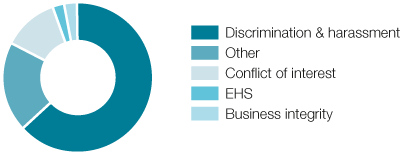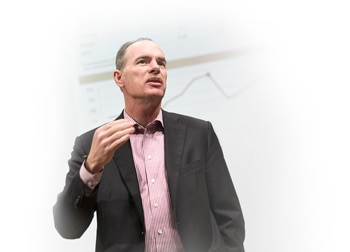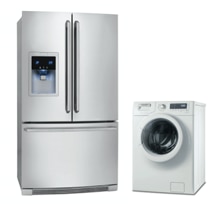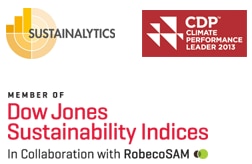Anti-corruption and public policy
SO2-8
As an important step in building a strong corporate culture, the rollout of a global Ethics Program is nearing completion. The program encompasses both ethics training for employees and the implementation of a whistle-blowing system – the Electrolux Ethics Helpline.
Anti-corruption
The Ethics at Electrolux program is designed to help employees translate into action Group expectations for personal and corporate accountability. It encompasses several tools, including a guidance booklet, an intranet site and mandatory e-learning. The program also includes the Ethics Helpline in local languages through which employees can confidentially register incidents of non-compliance to codes and policies.
The program was introduced during 2011. By year-end 2013, employees in 48 countries, or almost 90% of Group employees, had access to whistle-blowing systems. With this push, Electrolux has integrated markets in Europe, South Africa, the Ukraine and Asia Pacific into the program umbrella and these employees have been trained in the organization's ethics policies and procedures, including anti-corruption. Furthermore, the North American Alertline, which has been in place since 2005, was integrated into the group-wide Helpline system in 2013.
Through the Ethics Helpline, employees can report suspected misconduct in local languages, either through a call center or via a web portal. In most cases, reporters have the option to submit complaints anonymously. In a few countries however, local legislation requires reporter identification.
The Helpline is hosted by an external provider, who submits reports to a group of designated representatives from Group Sustainability Affairs, Human Resources, Legal and the internal auditing functions. After an initial review, the issue is investigated further by personnel trained to uphold principles of confidentially, independence and efficiency.
- Reports that are substantiated are mitigated and may lead to the following actions:
- Corrective action – training in Group policies, or adjustments in internal procedures
- Disciplinary action – verbal/written warning, probation, change of role
- Termination of employment
In 2013, approximately 169 reports were recorded through whistle-blowing systems. A total of 160 cases were investigated, which were all reported cases within the scope of the whistle-blowing systems 9 cases were deemed beyond the scope. The vast majority of reports relate to discrimination and harassment, such as use of abusive language or similarly disrespectful behavior. Confirmed misconduct generally resulted in warnings and retraining. In a few and serious cases, the report has led to termination of employment.
The Ethics Program, including the Ethics Helpline, is an important tool to build and maintain the corporate culture of ethics and integrity, diversity and respect for one another. The program has operational benefits as well. By identifying misconduct where it occurs and ensuring it is appropriately addressed, the Group is reducing and avoiding indirect costs stemming from interpersonal conflicts, potential absence from work and even loss of talent.
The next steps are to complete rollout of the program into markets such as Egypt, France and the Netherlands. Focus will also be on encouraging a corporate culture of openness to encourage employees to report misconduct.
Helpline calls categories percentage of total.

Fair competition
A new Antitrust Policy and guidelines were launched in 2012 and the Group’s Corruption and Bribery Policy and guidelines were re-launched. These have since the launch been supported by in-person training on antitrust and anticorruption for selected employees representing all regions in functions such as sales, marketing and procurement. Additionally, Electrolux in North America offers training on various policies in regards to compliance to related US legislation.
Public policy
Electrolux has adopted formal policy positions at Group level on strategic issues such as supporting market incentives that trigger change in consumer purchasing. Public policy initiatives are primarily conducted through industry organizations such as the European Appliance Industry Association (CECED) and the American Home Appliance Manufacturers Association (AHAM).
The regulatory agenda
EU directives on recycling (WEEE) and chemicals (REACH and RoHS) are inspiring legislators from China to the United States. At the same time, performance standards and legislation still vary between regions of the world, a challenge for companies active in many markets. Electrolux therefore supports global harmonization of standards and legislation.
With the shift from local to global marketplaces and product offerings as well as from national or regional regulation towards globally harmonized standards comes the increasing need to streamline the Group’s public policy efforts. This will be a focus area for the Group in 2014 and is especially relevant for regulations regarding chemicals and energy efficiency.
Public policy issues relevant to Electrolux across its markets include:
- Climate change, energy efficiency and resource efficiency.
- Producer responsibility for recycling and collection of waste.
- Product labeling and eco-design.
- Phase-out of chemicals of concern.
The Group strives to reflect its sustainability aims in its work within both industry organizations and policy work.
Australia
Electrolux in Australia has been active in the public policy arena and worked closely with the Australian government on the revised IEC refrigerator performance standard, to be published as an International Standard in 2014. It provided support for the introduction of demand response management of appliances, particularly air conditioners and water heaters. Thirdly, it contributed to a feasibility study for efficiency requirements for portable air conditioners. Finally, the company was engaged in establishing new efficiency levels for refrigerators to be launched in 2017 - including participation in testing.
Europe
Electrolux engages with legislators, parliamentarians and EU offices in regards to the issues mentioned above. Electrolux is registered through the EU’s voluntary transparency register, managed by the EU Commission, confirming that Electrolux European Affairs has a staff of three and annually invests SEK 2.6 - 3.0m (EUR 300,000 - 350,000) in public policy activities.
Legislation and EU policy initiatives of relevance include:
- The RoHS Directive
- Energy labels for household appliances
- REACH regulation
- Smart grids and appliances
- F-gas regulation
- Dialog on resource-efficiency and product durability
- The EU policy on innovation.
During 2013, activities included:
- Dialog on compliance testing of the European Energy Label, affecting several producers in the industry, including Electrolux (ATLETE2)
- Introduction of energy labeling and efficiency limits for vacuum cleaners
- The update of the EU legislation on F-gases
- Participation in the EU High Level group for Innovation Policy Management
- Membership and engagement in the Trans Atlantic Business Council (TABC) to support a free trade agreement between the EU and US.
- The Trans Atlantic Trade and Investment Partnership (T-TIP), a free trade agreement between the EU and the US.
In 2013, the EU adopted legislation that will introduce labeling systems for vacuum cleaners and hoods and update the labeling system for ovens, based on their energy efficiency and performance. At the same time, Ecodesign requirements will put a cap on corded vacuum cleaners wattage levels to a maximum of 1600 Watts, and set minimum standards for durability of their motors to at least 500 hours, together with dust pick-up requirements. Electrolux regards the energy label as a regulatory tool to increase transparency for consumers and push the market towards more energy efficient and better performing vacuum cleaners. At the same time, Ecodesign rules will remove the least efficient products from the market.
North America
Public policy work is conducted through AHAM, in the Group’s capacity as an Energy Star partner and in dialog with the US Environmental Protection Agency. Through AHAM, Electrolux has been active in the development of an industry-sustainability standard for refrigerators and washing machines. Similar standards are expected for dishwashers in 2014. The Group has also been engaged in the introduction of recycling schemes at the implementation of producer responsibility regulation across Canadian provinces. Electrolux supported AHAM’s, stance on proposed producer responsibility regulation in New York.
Political activities
Electrolux does not make political contributions, including donations to politicians or political parties. There may, however, be occasions where Electrolux will support some proposal made by a political party on a particular issue, for example, when legislation is under modification and is debated in the EU Parliament. Employees who engage in dialog with governments and other public bodies to inform or influence public policy must do so responsibly and transparently, making it clear at all times that they represent Electrolux.
Compliance
Potential non-compliance, disputes or items that pose a material financial risk are reported to Group level in accordance with Group policy.
Please see Annual Report, Contingent liabilities of material impact to the business.
Star performers 2014
The Small Appliance team received the Electrolux Sustainability Award for actively supporting the introduction of strong EU legislation for energy labeling. Demonstrating leadership, accountability and an inclusive approach, the team took the lead when several competitors dug in their heels against the labeling proposal.
CEO Statement

In 2013 we continued to deliver above our growth target and delivered 4.5% in organic sales growth.
CEO Statement

I'm convinced that raising product efficiency for the growing middle class is where long-term shareholder value creation lies.
Our products

Electrolux is the only appliance manufacturer in the industry to offer complete solutions for both consumers and professionals. The focus is on innovative and energy-efficient products in the premium segments.
Sustainability
Achieving the Group's vision of sustainability leadership is crucial to realizing the business strategy. The objective is to develop smarter, more accessible, resource-efficient solutions that meet people's needs and improve their lives. Read the comprehensive sustainability performance review.
Awards & recognition

Financial Reporting
Net sales for the Electrolux Group in 2013 amounted to SEK 109,151m, as against SEK 109,994m in the previous year. The organic sales growth was 4.5%, while currencies had an impact of -5.3%.
